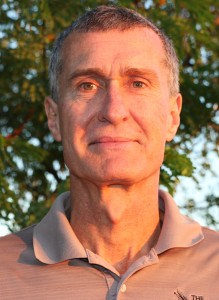Stephenville, Texas, USA
October 30, 2014
 Dr. James P. Muir, Texas A&M AgriLife Research plant scientist Stepenville, has been named a Crop Science Society of America Fellow for 2014.
Dr. James P. Muir, Texas A&M AgriLife Research plant scientist Stepenville, has been named a Crop Science Society of America Fellow for 2014.
The award will be formally presented at the society’s annual meeting, which will be held Nov. 3 in Long Beach, California.
Being named a fellow is the highest honor bestowed on member scientists, according to award documentation. Society members nominate colleagues based upon their professional achievements and meritorious service. Only about three-tenths of 1 percent of the society’s active and emeritus members are elected fellows.
Muir, who is based at the Texas A&M AgriLife Research and Extension Center at Stephenville, has been with AgriLife Research since 1997. Prior to his AgriLife appointment, Muir was in Mozambique as a researcher, educator and community developer. He continues to work with South American, European and African researchers.
Muir’s primary career research focus is forage ecology, but he has also worked with rangeland management, cellulosic biofuels, small ruminant health, domesticating native legumes and environmental sciences.
He is now part of a multi-national team examining how legume condensed tannins affect plant survival, ruminant health and other factors.
“Legume breeders have long selected legumes for low levels of condensed tannins because the compounds may impart a bitter taste to plants and discourage consumption,” Muir said. “Condensed tannins are also what make some teas bitter and give some types of wine a bite.”
But the tannins have other effects, such as reducing ruminant intestinal parasites and reducing rumen methane production, he said. The latter has been “implicated in greenhouse gas emissions from animal agriculture,” he said.
Muir earned a bachelor’s degree in biology from Wheaton College, Wheaton, Illinois, and his master’s and doctorate degrees in agronomy from the University of Florida.
He is also a Texas A&M AgriLife Research Fellow, Fellow of the American Society of Agronomy and a recipient of the American Forage and Grassland Council’s Merit Award. He was named a Texas A&M University System Regents Fellow in 2012.
He also holds a professorship at Tarleton State University, Stephenville.
According to the society’s website at http://www.crops.org , the organization is “a progressive international scientific society that fosters plant science for a better world.”
Founded in 1956, the society has more than 5,000 members “dedicated to advancing the field of crop science. Society members are dedicated to the conservation and wise use of natural resources to produce food, feed, fiber, fuel, and pharmaceutical crops while maintaining and improving the environment.”